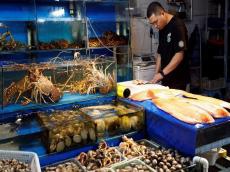|
|
TODAY.AZ / World news
China agree to start procedures for resuming seafood imports from Japan
30 May 2025 [21:26] - TODAY.AZ

By Alimat Aliyeva
China has agreed to initiate procedures to resume imports of Japanese seafood, which were banned in August 2023 following Japan's controversial release of treated water from the damaged Fukushima Daiichi nuclear power plant into the Pacific Ocean, Azernews reports.
According to sources familiar with the matter, Chinese authorities are expected to soon issue a formal notice easing the ban and begin the registration process for Japanese seafood processing companies. This regulatory process is anticipated to take several months.
The original ban stemmed from public health concerns after Japan began discharging treated but still mildly radioactive water into the ocean. This water had accumulated at the Fukushima plant site over more than a decade since the disaster.
The Fukushima crisis began in March 2011 when a massive earthquake and tsunami struck northeastern Japan. The disaster knocked out power and cooling systems at the Fukushima-1 (Daiichi) nuclear plant, leading to the meltdown of fuel in three reactors, building explosions, and a significant release of radioactive material into the environment. Cleanup and decommissioning have been ongoing ever since.
Currently, over 1.34 million tons of water — used to cool the melted reactor cores — has accumulated at the site. Although treated using an Advanced Liquid Processing System (ALPS) to remove most radioactive substances, the water still contains tritium, a radioactive isotope of hydrogen that cannot be filtered out. According to the Japanese government and the International Atomic Energy Agency (IAEA), the released water meets international safety standards, with tritium levels diluted to a maximum of 1,500 becquerels per liter — well below global health guidelines.
To address international concerns, Japan has implemented rigorous monitoring protocols, with the IAEA conducting independent assessments. So far, no abnormalities have been detected in marine life or ocean water near the discharge site.
The decision by China to move toward lifting the ban marks a significant thaw in trade tensions and could have broader implications for regional diplomacy and food security. Japan has long argued that the seafood from its waters remains safe and of high quality, a view supported by assessments from multiple international agencies and partner nations.
In the meantime, Japan continues to promote transparency in its handling of the Fukushima cleanup, including real-time data sharing and scientific cooperation with neighboring countries. If China fully lifts the ban, it could pave the way for other nations still hesitant about Japanese seafood to reconsider their positions.
URL: http://www.today.az/news/regions/259526.html
 Print version
Print version
Connect with us. Get latest news and updates.
See Also
- 13 December 2025 [21:55]
Remains of rare sun temple discovered in Egypt - 13 December 2025 [20:50]
SpaceX insider share sale sets $800 billion valuation amid possible IPO, letter shows - 13 December 2025 [20:20]
Ukraine to disband four international legion units by end of 2025 - 13 December 2025 [19:15]
UN to evaluate refugee strategy - 13 December 2025 [18:10]
N. Korea welcomes engineer troops' return from Russia's Kursk region - 13 December 2025 [09:00]
Dubai launches self-driving taxi tests - 13 December 2025 [08:00]
Reddit sues Australia over kids’ ban - 12 December 2025 [21:22]
Hidden apps are coming to Android - 12 December 2025 [19:53]
Niki Lauda’s car up for auction - 12 December 2025 [19:22]
China unveils largest AI supercomputer
Most Popular
 The intricacies of diplomacy: why is the 3+3 meeting postponed?
The intricacies of diplomacy: why is the 3+3 meeting postponed?
 The Armenian Crusade: The Vardanians are trying to play the religious card against Baku
The Armenian Crusade: The Vardanians are trying to play the religious card against Baku
 President Ilham Aliyev makes phone call to Chairman of Halk Maslakhaty of Turkmenistan
President Ilham Aliyev makes phone call to Chairman of Halk Maslakhaty of Turkmenistan
 Azerbaijan, Syria discuss media cooperation at Abu Dhabi summit
Azerbaijan, Syria discuss media cooperation at Abu Dhabi summit
 Azerbaijan, Kenya praise strengthening ties at high-level meeting in Nairobi
Azerbaijan, Kenya praise strengthening ties at high-level meeting in Nairobi
 Keys to new homes handed over to families returning to Badara and Ball?ca villages
Keys to new homes handed over to families returning to Badara and Ball?ca villages
 US-brokered peace plan provides solid basis for normalization between Baku and Yerevan, says Moody’s
US-brokered peace plan provides solid basis for normalization between Baku and Yerevan, says Moody’s
